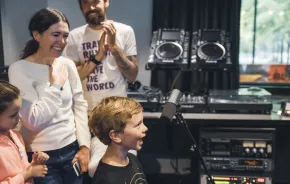
Social justice lawyer Frances Dewing believes it’s a human right to be safe online. After working in cybersecurity for some of the world’s most high-profile figures, she decided to create a safe online experience for everyone. In 2016, she co-founded Rubica, which makes a threat detection product designed to keep cybercriminals from pilfering passwords, documents and identities from individuals and families.
Part of her passion for the job comes from being a mom. “I’m always wearing two hats — cybersecurity professional and parent,” says Dewing.
“Rubica recently studied 20 of the most popular mobile apps/games for kids, ranking them for safety. Through kids’ apps, cybercriminals link to parents’ devices to steal passwords, documents and browsing history,” she warns.
How could cybercrime directly affect a family?
Cybercriminals target individuals on our devices, our personal accounts and our home networks — and often get away with tens of thousands to hundreds of thousands of dollars of peoples’ personal assets.
Take this example from a family’s home computer. While doing online research for a school project and checking his social media accounts, a teenage son inadvertently clicked on something that caused malware to infect the computer.
The next day, his mother used the computer to check her bank account. The malware redirected her to a fake webpage that looked exactly like her banking site.
When she logged in, the malware sent her banking password and details to cybercriminals who were able to siphon money from the family account.
The bank was not required to reimburse the family because technically they lost control of their password and home computer and the bank's site was not hacked.
How can parents teach their kids how to protect themselves online?
Our kids are growing up in a digital world, so we have to teach them “cyber street smarts.”
I practice what I preach with my own family. I teach my children about ads and pop-ups — how they use deceptive tactics to get you to click. I play video games and watch YouTube videos with them, pointing these things out in real-time.
I teach about social media and what information is not okay to post (address, phone number, where you will be on what date). And about being suspicious of friend requests from people you’ve never met in person. I also use Rubica at home, which is a safety net on all the devices my family uses.
What apps should our kids avoid and why?
Many free apps contain excessive ads with aggressive prompts for your child to download other apps or games.
Many of these free apps, and the secondary games they advertise, have invasive permissions that gain access to sensitive info on your devices, such as your contacts, camera, microphone, files, email, browsing history and location.
Avoid these apps and the secondary apps they insistently encourage your kids to download:
- Sonic Dash
- Rolling Sky
- Talking Tom
- Subway Surfers
What are the telltale signs that you've been hacked?
Five suspicious symptoms may suggest your device has been hacked:
- Slower performance: You may notice it takes longer than normal for apps to open or while browsing websites.
- You’ll notice apps that you don’t recognize, phone numbers that you didn’t dial, and texts/emails that you didn’t send.
- You’ll start seeing more frequent pop-ups and ads. These pop-ups and ads can be a vehicle for attempting to delivering malware to your phone.
- You’ll see changes to the phone's configuration that you didn't make yourself, such as home screen settings, layout and background images.
- You'll notice spikes in data usage.











